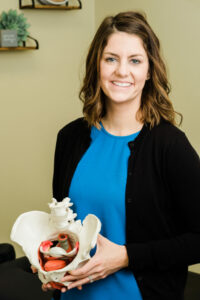
PITTSBURG ‒ Pelvic floor physical therapy is one of Community Health Center of Southeast Kansas’ newest services delivered by Physical Therapist Samantha Curran, PT, DPT, CMTPT.
Curran sees patients at the Pittsburg clinic where patients will receive an evaluation to determine therapy needs and treatment plan. The patients will have physical therapy appointments weekly. While at the clinic, patients will be educated in a home exercise program and will receive hands-on treatment. At this time, Curran does not currently see children under the age of 17 unless by case-by-case basis.
Curran, a Pittsburg native and St. Mary’s Colgan High School graduate, still remembers one of her first patients that needed pelvic floor therapy while she was doing her clinicals for school. The patient struggled with urinary incontinence after a stroke. She was a young mother with a three-year-old. She pushed away her spouse and friends because she didn’t want to go into public for fear she would become incontinent.
“During our appointment, during our history taking, she just started crying and at that point it was when I realized it wasn’t just physical,” Curran said. “There was a lot of social and psychological components that played a role and there were not a lot of providers that were doing it, especially in our area.”
Thus, she started her career in the field of Pelvic Floor Physical Therapy.
Curran completed a Bachelors in Health, Sport and Exercise Science in 2012 from the University of Kansas and received her Doctorate of Physical Therapy in 2016 from Missouri State University. She went on to the Foundational Concepts clinic in Kansas City, Missouri, where she continued her training and mentorship.
Curran said she’s grateful her education has allowed her to be able to bring something unique back to Pittsburg.
The pelvic floor is a group of muscles, just like any other muscle group in the body, Curran said. It helps in the control of bladder, bowel, and sexual functions. The pelvic area has been a taboo topic for many years, she said, and it is becoming more of a common discussion. Curran said she encourages people to talk to their doctor. Not speaking to the doctor in turn “leads to isolation, sometimes relationship issues and often times anxiety and depression,” she said, “had this been discussed early on and addressed there is a good chance the rest could have been avoided.”
CHC providers are there to listen to their patients and “consider the whole person,” Curran said, adding that the health providers work closely with the physical therapists.
“Believe it or not this is not an uncommon issue, it’s just one that isn’t talked about much,” she said. “If you have issues that are not normal for you please ask about it.”
Men can have a pelvic floor issues also, Curran said.
“We see men with urinary leakage, bowel leakage, constipation and urgency, erectile dysfunction, pelvic pain, and many men post prostate cancer treatment,“ she said.
Already, her career has been rewarding and she looks forward to continuing to help patients with their pelvic floor therapy at CHC/SEK.
“Whenever patients come for that first appointment, they are very nervous and scared, they don’t know what to expect,” Curran said, adding that the most rewarding part is after approximately four to six weeks of therapy the patient begins to noticeably feel better. “It’s so awesome for them to come in and you can see a visible change in their demeanor, they may say thank you or their spouse comes in and says thank you for helping to get them their life back and their relationship back.”